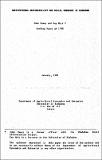Institutional Responsibility For Social Forestry In Zimbabwe
| dc.contributor.author | Casey, John | |
| dc.contributor.author | Muir, Kay | |
| dc.coverage.spatial | Zimbabwe | en_GB |
| dc.date.accessioned | 2014-10-03T11:12:20Z | |
| dc.date.available | 2014-10-03T11:12:20Z | |
| dc.date.issued | 2014-10-03 | |
| dc.identifier.uri | https://opendocs.ids.ac.uk/opendocs/handle/20.500.12413/4642 | |
| dc.description.abstract | It has become widely accepted by national governments and development agencies that the rapid deforestation of Africa must be reversed. The various disciplines will place emphasis on different aspects of the problem and will therefore implement programmes with specific objectives in mind. If the objective is to obtain the fastest possible tree cover within the immediate future, then establishing eucalyptus or other developed fast-growing exotic species may be the solution. In a sector policy paper on Forestry in 1978 the World Bank advocated Australian eucalyptus plantations as a solution to the critical shortage of fuelwood. This solution was put forward on the basis that the eucalyptus grows faster than other known species. It makes no reference to the poor wood-burning properties of eucalyptus and no attempt is made to determine whether, in fact, the rural people consider firewood the most critical issue arising from deforestation. | en_GB |
| dc.language.iso | en | en_GB |
| dc.relation.ispartofseries | Working Paper AE;1/88 | |
| dc.rights.uri | http://creativecommons.org/licenses/by-nc-nd/3.0/ | en_GB |
| dc.subject | Environment | en_GB |
| dc.title | Institutional Responsibility For Social Forestry In Zimbabwe | en_GB |
| dc.type | Series paper (non-IDS) | en_GB |
| dc.rights.holder | University of Zimbabwe | en_GB |


